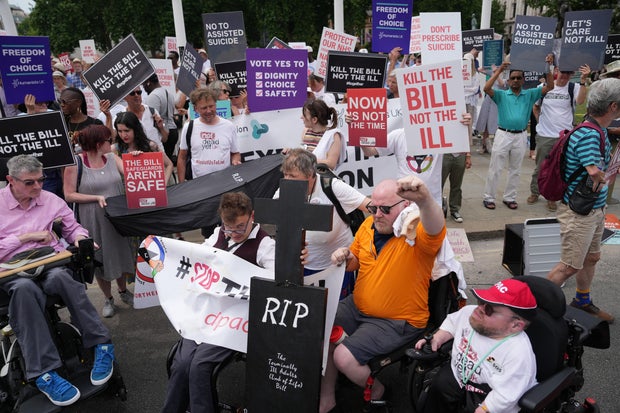U.K. lawmakers back assisted dying bill that would allow terminally ill adults to choose to end their lives
London — After hours of impassioned debate, British lawmakers in the House of Commons voted Friday to pass a bill that would allow terminally ill adults in England and Wales to choose to end their lives. The bill passed by 23 votes, with hundreds protesting about the divisive issue outside of parliament, from both sides of the debate.
The Terminally Ill Adults (End of Life) Bill will now undergo months of scrutiny by the House of Lords, the upper chamber of Britain’s Parliament. The lords, who are not elected, can debate, delay and amend the bill, but they have little power to block legislation passed by the elected Members of Parliament in the House of Commons.
The central tenet of the bill is that adults over 18 who are deemed to have less than six months to live could — after a series of safeguarding checks — be provided help to end their lives, in the form of fatal drugs that they could self-administer.
CARLOS JASSO/AFP/Getty
In November, British lawmakers gave initial approval to the new law, passing it by 330 votes to 275 — a wider margin that indicates some members of parliament changed their minds before Friday’s vote.
Since the first vote, the original bill proposed by Labour Party lawmaker Kim Leadbeater underwent several changes, including the dropping of a provision that would have required a judge to sign off on any final decision granting a medically assisted death. The current bill requires any request to be approved by two doctors and a panel that includes a social worker, a senior legal figure, and a psychiatrist.
In a debate before the vote on Friday, Leadbeater told parliament about the many stories she had heard from people who witnessed friends and family suffer traumatic deaths.
“Not supporting the bill today is not a neutral act. It is a vote for the status quo,” she said, according to The Associated Press. “And it fills me with despair to think MPs [Members of Parliament] could be here in another 10 years’ time hearing the same stories.”
Leadbeater and other supporters of the bill argue that people with terminal diagnoses should have the right to choose whether to continue living. They have cited stories of people taking their own lives in secret because no-one could legally help them.
They also argue that it isn’t fair that people with enough money can currently seek life-ending care by traveling to Switzerland. More than 500 Britons have ended their lives in Switzerland, where foreigners can opt for an assisted death.
CARLOS JASSO/AFP/Getty
Opponents argue that elderly or disabled people could be manipulated — overtly or covertly — into ending their lives, to save money or to relieve a perceived burden on loved ones. Others say better end-of-life and health care would be a better alternative.
Outside parliament on Friday, protesters faced off with contrasting slogans. Some wore clothes bearing the phrase: “Campaign for Dignity in Dying,” while opponents held banners calling the U.K.’s state-run National Health Service, the “National Suicide Service.”
The vote paves the way for what could be one of the biggest changes in social policy in the U.K. since the partial legalization of abortion in 1967.
If the bill passes the House of Lords, it is expected to take another four years to be fully implemented.







